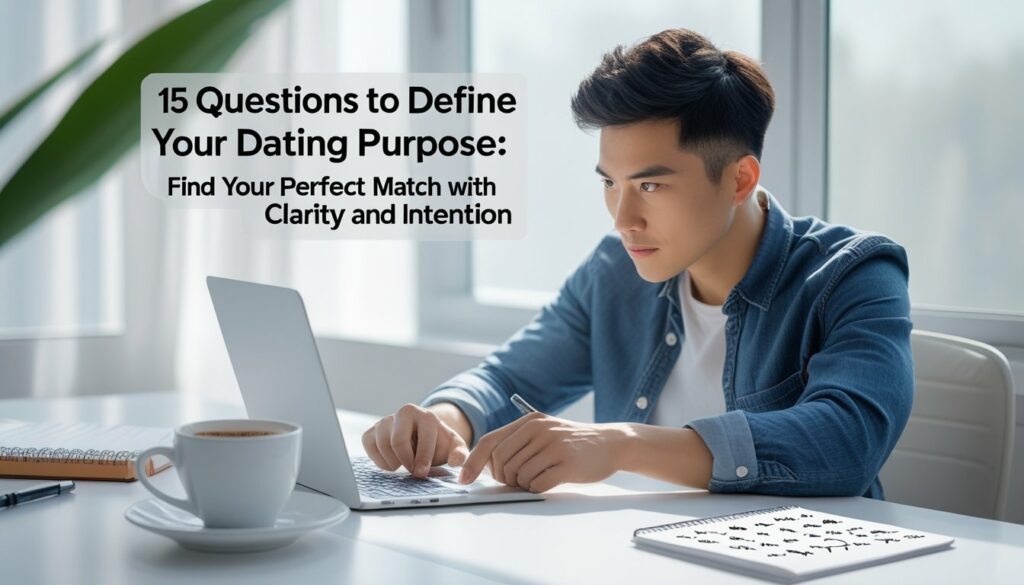Dating often feels confusing when you don’t have a clear purpose. You might go on dates without really knowing what you want or hoping things will just work out.
Many people waste time and energy in relationships that don’t match their goals.

If you take time to define your dating purpose, you make better choices about potential partners. This also saves you from unnecessary heartbreak.
When you know what you’re looking for, you can focus your energy on meeting people who share similar relationship goals.
These questions will help you discover what matters most to you in dating and relationships.
1) What do I truly want from a relationship?

This is one of the most important questions you can ask yourself about dating. Think about what you truly desire in a relationship, not what others expect from you.
Are you looking for a long-term commitment that leads to marriage? Maybe you want companionship without serious plans.
Perhaps you’re interested in casual dating to meet new people. Your answer might include emotional needs like support, understanding, and trust.
You might want someone to share adventures with, or a partner who helps you grow as a person. Be honest with yourself.
If you want children someday, add that to your list. If you dream of traveling the world with your partner, write it down.
Your dating purpose should match your real desires. When you’re clear about what you want, you make better choices about who to date.
Your wants may change over time, and that’s okay. Check in with yourself every few months to see if your relationship goals are still the same.
Think about your daily life. Do you want someone to live with? A weekend partner? Someone who shares your faith or values?
2) Am I looking for companionship or long-term partnership?

Dating means different things to different people. You need to be clear about what you want before you start dating.
Companionship focuses on having someone to spend time with, go on dates, and share experiences. You might enjoy activities together without planning a future together.
Long-term partnership involves building a life together. This means shared goals, values, and possibly marriage or starting a family.
Think about your current life stage and what makes you happy. Do you want someone to hang out with on weekends? Or are you ready to merge your life with another person?
Be honest with yourself about your true desires. Your answer will help you choose the right dating apps and communicate better with potential matches.
It’s fine if your answer changes over time. What matters is being clear about your current needs and sharing them with the people you date.
Tell potential matches what you’re seeking. This saves time and helps avoid hurt feelings when two people want different things.
3) What values are non-negotiable to me?

Your core values shape who you are and guide your choices in relationships. Identify the values you won’t compromise on, like honesty, respect, or family.
Think about what makes you feel angry or upset in relationships. These reactions often point to your non-negotiable values being crossed.
Make a list of 3-5 values that matter most to you. Ask yourself: Would I end a relationship if someone didn’t share these values?
Your values might include things like kindness, faith, ambition, or loyalty. There’s no right or wrong answer—what matters is being true to yourself.
Watch how potential partners treat others, spend their time, and make decisions. Their actions will show if their values match yours.
Shared values create stronger connections. When you’re clear about your must-haves, you attract people who appreciate what matters to you.
Don’t change your values for someone else. The right person will respect and share the principles that guide your life.
4) How important is physical attraction in my dating purpose?

Physical attraction plays a role in dating, but it shouldn’t be the only factor you consider. It’s natural to want to feel a spark with someone you date.
Think about what physical attraction means to you. Does it mean someone who matches specific looks, or is it more about feeling chemistry when you’re together?
Attraction can grow over time. You might find someone becomes more attractive as you get to know their personality and values.
Make a quick list of what you find attractive. Include both physical and non-physical qualities.
Be honest with yourself about how much looks matter in your dating choices. There’s no wrong answer—just make sure your expectations match your values.
Balance physical attraction with other important factors like shared interests, values, and life goals. This creates a stronger foundation for lasting relationships.
Your views on physical attraction might change as relationships develop. What seems crucial at first might become less important as deeper connections form.
5) Do I want someone with similar life goals?

When you share life goals with your partner, your relationship grows stronger. Think about what you want in life—career plans, where you want to live, or if you want kids.
If two people have different goals, this can create stress and conflict. A partner who wants to travel the world might not fit well with someone who dreams of settling down in a small town.
You don’t need to have exactly the same goals as your partner. What matters is that your main life goals work together and don’t clash.
Take time to think about your most important goals. Do you want to start a business? Go back to school? Have a big family?
Being clear about your goals helps you avoid dating people who want very different things. It saves both of you time and heartache.
Talk about goals early when dating someone new. You’ll learn if your future plans match up before getting too emotionally invested.
6) Am I open to dating someone from a different background?

Dating someone from a different background can bring exciting new perspectives to your life. You learn about different cultures, traditions, and ways of thinking that might be completely new to you.
Before you decide, think about what “different background” means to you. It could be about culture, religion, education, or social class.
Your family’s views might affect your choice. Some families embrace differences, while others prefer partners from similar backgrounds.
Think about what you value most in a relationship. Do you want someone who shares your exact beliefs, or are you excited to learn from different viewpoints?
Be honest with yourself about any biases you might have. Everyone has them, but recognizing yours helps you make better choices about who to date.
Successful relationships come from shared values, respect, and good communication. These things matter more than having the same background.
Ask yourself if you’re ready to learn and grow with someone different from you. The right person might open your eyes to amazing new experiences.
7) What past relationship patterns am I ready to change?

Look back at your past relationships. What keeps showing up?
Maybe you pick partners who need fixing, or you avoid tough conversations until they blow up. Do you rush into relationships too fast? Or do you stay in them too long, hoping things will get better?
Think about how you handle conflicts. Do you shut down, storm off, or say things you regret?
You might notice you always date the same “type” of person, even though it never works out. Or maybe you lose yourself trying to make others happy while forgetting your own needs.
Changing these patterns starts with seeing them clearly. Write down what you want to do differently next time.
Maybe you’ll set better boundaries, speak up sooner, or take things slower. Small changes make a big difference.
Pick one pattern to work on first. You don’t need to fix everything at once.
Your past patterns don’t have to be your future ones. Every new relationship is a chance to try something different.
8) How much time and energy can I realistically invest in dating?

Think about your daily schedule. Your job, family duties, hobbies, and self-care all need time and attention.
Dating should fit into your life without causing stress or burnout. Be honest with yourself about your free time.
If you work long hours and have other commitments, you might only have 1-2 evenings free each week for dates. Your energy levels matter too.
Dating takes emotional and mental energy. Meeting new people, having conversations, and processing feelings requires you to be present and engaged.
Set clear boundaries around your dating time. You might decide to limit first dates to coffee meetings or quick walks.
This helps protect your schedule while still giving you chances to meet people. Quality matters more than quantity.
It’s better to have one meaningful date where you’re fully present than several rushed meetings when you’re tired or distracted.
Consider your dating apps usage too. Set specific times to check messages and browse profiles.
This stops dating apps from taking over your whole day.
9) Am I looking to date casually or with seriousness?

When you know your dating goals, you make better choices about potential partners.
Some people want casual dating with no strings attached. Others seek serious relationships that could lead to marriage.
Think about where you are in life right now. Are you focused on your career or personal growth?
Maybe you don’t have time for a serious commitment. Or perhaps you’re ready to find your life partner and start building a future together.
Your answer shapes the type of people you should date. If you want something casual, look for others who share that mindset.
If you want a long-term relationship, seek partners who want the same. Be honest with yourself and the people you date about what you want.
Mixed signals and unclear intentions can hurt feelings and waste time. When both people have matching relationship goals, dating becomes more enjoyable and meaningful.
It’s okay to change your mind as you grow and learn more about yourself. What you want today might be different from what you’ll want next year.
10) How do I define emotional compatibility?

Emotional compatibility means you and your partner understand and respond to each other’s feelings in helpful ways.
You feel safe sharing your emotions, and your partner feels comfortable doing the same. Think about how you handle stress, joy, sadness, and anger.
Do you both express and process emotions in ways that fit well together? Some people need lots of talking and comfort, while others prefer space to work through feelings.
You don’t need to be exactly alike to have emotional compatibility. You might handle feelings differently, but still support each other well.
The key is respecting and working with these differences. Pay attention to how you feel after emotional conversations with someone you’re dating.
Do you feel heard and accepted? Can you be your true self without fear of judgment?
Ask yourself if you can count on them during tough times. The right person will celebrate your wins and comfort you when you’re down.
Watch how they treat others’ feelings too. This shows how they might handle your emotions in the long run.
11) What role does communication style play for me?

Your communication style affects every part of your dating life.
Think about how you express your thoughts and feelings. Are you direct and straightforward, or do you prefer to hint at things?
Some people love deep conversations that last for hours. Others keep things light and playful.
There’s no wrong style, but finding someone who matches your way of talking makes everything easier. Consider how you handle disagreements.
Do you need time to process before discussing issues? Or do you like addressing problems right away?
Your answer helps you find partners who will work well with your style. Text messages and phone calls matter too.
You might prefer quick check-ins throughout the day, or longer chats in the evening. Be clear about these preferences to save both people from frustration.
Pay attention to how you feel when talking with potential partners. Good communication should feel natural and comfortable, not forced or tense.
Think about past relationships. Which communication patterns worked best for you? Use these experiences to guide your future dating choices.
12) What boundaries am I unwilling to cross?

Setting clear boundaries in dating protects your values and well-being.
Think about what lines you won’t cross, no matter how much you like someone. Define your physical boundaries early.
Decide what types of touch or intimacy you’re comfortable with and when you’re ready for those steps. Your time matters too.
You might not want late-night calls or texts, or you may need certain days just for yourself or family. It’s okay to say no to plans that don’t work for you.
Money boundaries help keep you safe and stable. Decide if you’ll split costs, take turns paying, or set spending limits on dates and gifts.
Your deal-breakers might include smoking, drinking, or other lifestyle choices. Write down behaviors you won’t accept, like name-calling or pressure to change your beliefs.
Trust your gut about digital boundaries. Choose what you share on social media and when to connect online.
You can keep some parts of your life private. Good boundaries make relationships stronger.
The right person will respect your limits.
13) Do I want children or a family-oriented partner?

Having kids is one of life’s biggest choices. Be clear about whether you want children before getting serious with someone.
Some people dream of being parents. Others prefer a child-free life.
Neither choice is wrong, but you and your future partner need to agree. Think about how you picture your ideal future.
Do you see yourself taking kids to soccer practice? Or would you rather focus on travel, career, and other interests?
If you want children, look for a partner who shares your family values. Find someone who talks positively about kids and enjoys spending time with little ones.
If you don’t want kids, be upfront about it early. You don’t want to waste time with someone who has different life goals.
Consider practical things too. Are you ready for the responsibilities of parenting?
Can you handle the time, money, and energy kids require? Talk openly with potential partners about family plans.
It’s better to discuss these big topics early.
14) How important is financial stability in my dating purpose?

Money talks matter in dating. Decide what level of financial stability you want in a partner, and what you bring to the table yourself.
Being clear about money helps you avoid future stress. Do you want someone with a steady job?
Are you okay dating someone still figuring out their career? These questions deserve honest answers.
Think about your lifestyle and goals. If you dream of traveling or buying a home, you’ll want a partner who shares similar financial values and capabilities.
It’s not shallow to consider finances in dating. Money affects daily life, from choosing restaurants to planning vacations.
You want someone who manages money in ways that match your approach. Watch how potential partners handle money early on.
Do they spend responsibly? Are they open about financial topics?
These signs tell you if your money values align. Financial stability means different things to different people.
You get to define what level matters to you in dating. Be upfront about your expectations.
15) Am I seeking someone who shares my interests and hobbies?

Having common interests with your partner creates natural opportunities to spend quality time together.
When you both enjoy the same activities, you’ll find it easier to plan dates and share experiences. Being passionate about different things is okay too.
You and your partner don’t need to match on every hobby. What matters is having a few key interests that bring you together.
Think about which activities mean the most to you. Maybe you love hiking, cooking, or playing music.
Consider if sharing these specific interests with a partner would make your relationship more fulfilling. Sometimes opposites attract and can help each other grow.
Your partner might introduce you to new hobbies you never considered before. You might do the same for them.
The key is finding someone who respects your interests, even if they don’t share all of them.
Look for a partner who shows curiosity about your hobbies and supports your passion for them. Shared values are more important than shared hobbies.
While common interests can strengthen your bond, they shouldn’t be the main factor in choosing a partner.
Why Defining Your Dating Purpose Matters

When you know what you want from dating, you make smarter choices and find better matches.
You waste less time and have more meaningful connections.
Clarity For Better Connections
Dating with purpose means knowing exactly what you’re looking for in a relationship.
Think about what makes you happy and what kind of future you want to build. You’ll spot red flags faster and focus on people who share your values.
This saves you from spending time with someone who wants different things. Your dating purpose acts like a compass that guides your choices.
It helps you say “yes” to the right people and “no” to those who don’t match your goals.
Reducing Confusion And Mixed Signals
Clear dating goals help prevent misunderstandings from the start. Share what you want early on, so both people can decide if they’re a good match.
Being upfront about your intentions shows respect for yourself and others. It stops you from sending mixed messages or leading someone on.
Your dating purpose gives you confidence to have honest talks about the future. Instead of guessing what the other person wants, you can discuss your goals openly and see if they match.
This straightforward approach leads to better first dates because both people know what to expect.
Integrating Purposeful Questions Into Your Dating Life

Smart questions help you connect with potential partners and learn what matters most.
They create real bonds and show you care about getting to know someone.
Building Confidence In Conversations
Starting deep conversations can feel scary at first. Take small steps by practicing with friends or family before trying with dates.
Pick two or three questions you feel comfortable asking. Write them down in your phone notes so you remember them easily.
Watch your date’s body language and tone. If they seem interested and engaged, keep going deeper.
If they appear uncomfortable, switch to lighter topics. Share your own answers too.
This creates trust and helps your date open up more.
Creating Meaningful Dialogue
Start with fun, easy questions about hobbies or work.
Then move to deeper topics like values and dreams.
Try these conversation starters:
- “What’s the best advice you’ve ever received?”
- “What makes you feel most alive?”
- “What would your perfect day look like?”
Listen carefully to their answers.
Ask follow-up questions to show you’re interested.
Take turns sharing.
Let your conversation flow naturally between both people.
Give your date time to think and respond.
Silence can show you respect their thoughts.




